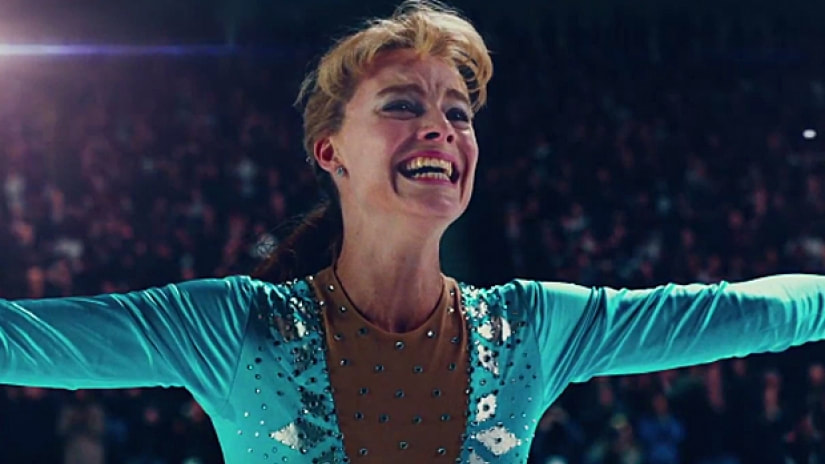Gillespie goes all the way back to Harding’s childhood, when she’s a standoffish little girl (McKenna Grace) flipping off her young rivals as she skates off the rink. Pushed to extremes by her ruthless mother LaVona (Allison Janney), Harding becomes a generational physical talent, the only woman to perform a triple axel jump at that time. Despite her gifts, she’s shunned by figure skating and its advertisers for not conforming to their perceptions of grace and class. Her homemade dresses and squirrel-fur coats always cost her points, or at least that’s what Harding believes. She meets Gilooly as a teenager, and quickly marries him after a confrontation with LaVona leaves a knife in her arm. At least LaVona, in her manipulation and withholding of affection, has a perverted altruistic goal for her daughter, which is to her mold her into a star. Gilooly is only exploitative, jealous of Harding’s spotlight and resentful of his own deep mediocrity. Their few happy moments are enough to blind the emotionally needy Harding to the many bad ones, many of which end with Gilooly bouncing her off the walls or waving a gun in her face.
In I, Tonya’s telling of the sordid events of the 1994 Winter Olympics, the facts are largely agreed upon but motivations and who-knew-what-when are up for grabs. The comically useless and delusional friend-of-Gilooly Shawn Eckhardt (Paul Hauser) did hire a goon to bash Kerrigan’s knee. The act itself is in keeping with the film’s tone, in that Gillespie captures both the absurdity of the moment with the real pain and horror of it. Kerrigan’s anguished screams echo over the training facility as the goon needlessly bashes open a glass door with his head. What’s unclear is when Harding knew this was going to happen. She asserts she knew nothing of any plot beyond loose talk of some light intimidation, but the film subtly undermines her credibility. She uses her asthma as an excuse but for a professional athlete, she sure smokes a lot. Robbie gives the character the habit of talking a little past the point when she should stop talking, thus undermining her point and pushing her agenda a bit too far. Gillespie doesn’t make things as pat as they could be. It’s easy to imagine a cinematic Harding resculpted as a wronged woman, taken advantage of and demeaned by the useless men in her life, but despite the film’s awkward, direct entreaties to the camera, there’s always that dangling uncertainty to muddy the water.
The strangeness of the events and Gillespie’s kinetic telling of them make I, Tonya a perversely delightful film, aided most by the main performances. Janney is playing one thing as LaVona, and she never wavers from it, but it’s always entertaining. Hauser is giving a shameless performance as Eckhardt, a type instantly recognizable from current events as a person distantly aware of their incompetence and insignificance but desperately in need of feeling anything but. Stan’s Gilooly is another individual aware of his weaknesses, but also knows that he’s got at least the upper hand when it comes to physical strength. His impotent rage, boiling behind his eyes and his useless mustache, can only be unleashed on the person least likely to retaliate effectively.
That person is given exceptional life by Robbie. The character is not honest for much of her significant screentime, but on the ice, Robbie’s Harding is brimming with a sad longing for admiration and cheers and respect, begging the audience to love her. When she’s on her skates, she’s working with truth, and Gillespie includes footage of the actual Harding skating with the same desperation on her face. It’s both a strong impersonation and a raw stripping-bare for Robbie, particularly in a long close-up of her getting ready for a routine in a mirror while her world is collapsing around her. Robbie takes her time, and Gillespie gives her all she needs as she at first fails to stifle her sobs and then tucks them back inside her before putting on a smile that no one would believe, but that she must if she’s going to go on.
I, Tonya could’ve used more subtlety in how it chooses to tell this story, but when the real version lacks that quality, it was surely difficult for Rogers to work it into his script. When Harding is plainly accusing the viewer of unjustly relegating her to shameful celebrity boxing shows, that’s too heavy-handed as media criticism by far, but out of the mouth of Harding, it might just be manipulation on her part. The film resists easy reconciliations between any of its characters, or between the characters and the viewer, because this is an ugly story full of people unworthy of rapprochement. That doesn’t mean it can’t be fun. The exploits of Jordan Belfort kept me enthralled and disgusted for over three hours. At the opposite end of the economic spectrum, Tonya Harding’s life story is often just as funny and thought-provoking, and an hour shorter. B+

 RSS Feed
RSS Feed